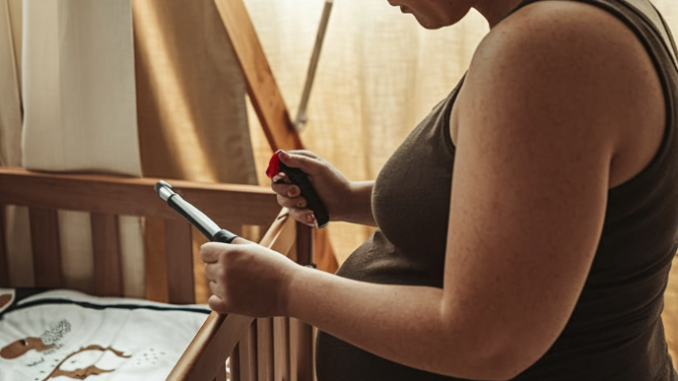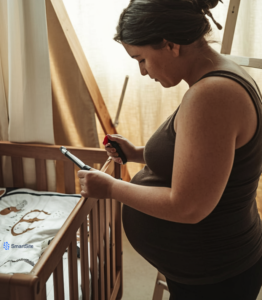
Eloise, nine months pregnant and filled with a nesting urgency, was growing increasingly frustrated with her husband, Tom. Despite her constant reminders, the crib remained in its unopened box, a symbol of his procrastination and her growing sense of isolation. With the baby’s arrival imminent, Eloise decided to take matters into her own hands, determined to teach Tom a lesson he wouldn’t soon forget.
I sat in the nursery’s armchair, my eyes locked on the unopened crib box that had been sitting in the corner for weeks. The rest of the room was ready for our baby, but that unassembled crib felt like a looming symbol of all Tom’s broken promises. Every time I asked him to put it together, his response was always the same: “Tomorrow.” But tomorrow never seemed to come, and now, here I was, exhausted and feeling more alone than ever.
For Tom, assembling the crib was just another chore on his endless to-do list. But to me, it was a vital part of preparing for our baby—a symbol of our partnership, which had started to feel more like a solo journey. The longer the crib sat untouched, the more I began to question if I could truly rely on him when it mattered most.
Fed up, I decided to do it myself.
I dragged the heavy box across the room, my back protesting with each movement. As the baby shifted inside me, a sharp pang reminded me that I shouldn’t be exerting myself like this. But what choice did I have?
The instructions were a jumbled mess, but I pressed on, piece by piece, screw by screw, my hands trembling with the effort. Just as I was struggling with a particularly stubborn part, Tom walked in. He had that relaxed look on his face—the one that used to make me fall in love with him—but now it only fueled my anger.

“Hey,” he said casually, glancing at the half-assembled crib. “Good job. Why’d you ask me to help if you could do it yourself?”
I stared at him in disbelief. Did he seriously just say that? I wanted to scream at him, to make him understand how much he was letting me down, but I knew it wouldn’t make a difference. So instead, I turned back to the crib, tears streaming down my face.
Tom stood there for a moment, then shrugged and left the room, leaving me to finish what should have been a shared task. By the time I was done, I felt utterly defeated. I sank to the floor, staring at the crib through a haze of tears. This was supposed to be a moment we shared—something we could both look back on with fondness. Instead, it had become another reminder of how alone I felt.
That night, as I lay in bed next to Tom, my mind raced. It wasn’t just about the crib. It was about the way he dismissed my concerns, acting as if my strength and independence meant I didn’t need him. But I did need him—just not like this. Something had to change. This wasn’t just about building a crib; it was about building our life together.
The next morning, I woke up with a plan. I wasn’t usually one for vindictive acts, but after what had happened, I knew Tom needed a wake-up call.
“Tom,” I said, rubbing my back as if it ached more than it did. “I think I’m going to take it easy today. I’ve just been so tired lately.”
He barely looked up from his phone. “Sure, babe. Take all the time you need. I’ve got everything under control.”
That was exactly what I wanted to hear. “I invited a few friends and family over tomorrow for a little get-together before the baby comes. Could you handle the rest of the preparations? You know, get the cake, set up the decorations, make sure everything’s perfect?”
He waved a hand dismissively. “Yeah, no problem. How hard can it be?”
Oh, Tom. If only you knew.
I spent the rest of the day lounging on the couch while he tinkered with his computer, completely oblivious to what he had just agreed to. The next morning, I stayed in bed longer than usual, letting him oversleep just enough to put him behind schedule.
When he finally woke up, I handed him the list I’d prepared. It looked innocent enough—just a few tasks to get the party ready—but I’d left out one crucial detail: there wasn’t nearly enough time to get everything done.
“Here’s the list,” I said, stifling a yawn. “I’m just going to rest a bit more. You’ve got this, right?”
Tom scanned the list, still groggy. “Yeah, no worries. I’ll get it all done.”
I bit back a smirk, knowing this would be interesting.
An hour later, I heard him in the kitchen, cursing under his breath as he scrambled to complete the tasks. Cabinets slammed, and I heard him mutter something about the cake order. I stifled a laugh, imagining him panicking at the bakery, trying to charm his way into getting a last-minute cake.
This was exactly what I wanted him to experience—the sheer panic of realizing he was completely unprepared.
As the morning wore on, his stress levels became palpable. He rushed in and out of the house, arms full of groceries, decorations half-dangling from his hands. At one point, he poked his head into the bedroom, his hair disheveled.
“Babe, where did you say the streamers were?” he asked, his voice higher than usual.
“Check the hall closet,” I mumbled, pretending to drift back to sleep.
I knew the streamers weren’t in the hall closet—they were buried in the basement behind a stack of old Christmas decorations. But he didn’t need to know that.
By the time the guests started arriving, Tom was a mess. The decorations were haphazardly placed, the food barely prepared, and I could see the panic in his eyes as he tried to hold it all together.
I watched from the couch, feigning interest in a magazine as our friends and family filled the living room. The moment of truth came when Tom’s mother arrived. She gave him a once-over, her eyebrows knitting together.
“What’s going on here, Tom?” she asked, eyeing the half-hung decorations and the empty spot where the cake should’ve been.
Tom stammered, running a hand through his hair. “I, uh, I had everything under control, but… things got a little crazy.”
His mother sighed, shaking her head. “You should’ve known better.”
Tom looked like he wanted to disappear, and for a moment, I almost felt sorry for him. But then I remembered the weeks of empty promises, the nights spent worrying, and the crib I’d assembled on my own.
No, he needed to feel this.
After the party, when the guests had left, Tom and I sat down at the kitchen table. He looked drained, defeated. I let the silence stretch until he finally spoke.
“I’m sorry,” he said quietly. “I didn’t realize how much I was leaving on your shoulders. I thought I was helping, but I wasn’t… I wasn’t there like I should’ve been.”
I nodded, a knot forming in my throat. “Tom, I need to know I can rely on you. Not just for the big things, but for everything. I can’t do this alone, and I shouldn’t have to.”
He reached across the table, taking my hand. “I promise, I’ll do better. I’ll be there. I’ll change.”
I searched his eyes, seeing the sincerity in them. “Okay,” I said finally. “But this is your chance, Tom. Don’t waste it.”
Leave a Reply